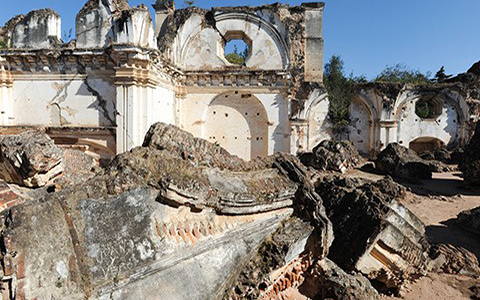Background
Project acronym: POLYTECT
Historically a target for earthquakes, Italy has also become an epicentre in the search for ways to reduce or prevent the loss of life and property when these sudden and unpredictable events occur.

The latest breakthrough in this effort is the “seismic wallpaper” – thin, woven material made of glass and plastic fibres that is glued to walls to increase their resistance to cracking and collapsing. This type of textile can also be used to strengthen dikes and embankments built to prevent landslides and floods.
Leading this revolutionary effort is the EU-funded project POLYTECT, or Polyfunctional Technical Textiles against Natural Hazards. The initiative united researchers from 12 countries not only to help save lives and structures, but also to revive a struggling industry.
“Textile makers are experiencing difficult times these days because of low-cost competition from Asian countries,” says POLYTECT’s coordinator Donato Zangani, of the Genoa-based engineering firm D’Appolonia. “So we thought: how can we develop textiles that can be used to reduce the damage caused by earthquakes, while also opening new markets?”
The idea worked. Zangani’s team discovered a way to weave together glass and plastic fibres in three different directions. This means that the protective wallpaper can support buildings regardless of the direction that earthquake waves travel.
POLYTECT researchers also developed a way to weave fibre-optic sensors into the wallpaper that use signals from lasers to monitor the health of walls – before, during and after an earthquake.
“The sensors can tell us if something happened to the wall and, if so, where the failures are,” explains Zangani. “They can also tell us whether a building is still safe.” Data from the sensors not only can help maintain existing buildings, but also help make new structures more earthquake-resistant.
The wallpaper was exhaustively tested at the European Centre for Training and Research in Earthquake Engineering in Pavia, Italy, which has a “shake table” that gauges the ability of structures to withstand violent jolting.
“We built a two-story stone-masonry house, about 5 metres high – similar to the buildings in historical areas of central Italy. It nearly collapsed when we shook it,” says Zangani. “Then we repaired the house and covered it with seismic wallpaper. When we shook the building again, it cracked but remained intact. The shake table was not able to break it.”
Because they are rigid and brittle, masonry buildings can crack and collapse very quickly during an earthquake. “The key to the seismic wallpaper is that it absorbs and dissipates some of the energy from the earthquake,” says Zangani, “while providing more give-and-take to walls.” The wallpaper, which is paintable, is several millimetres thick and glued to internal or external walls with about 1 centimetre of mortar-based adhesive.
Tests have shown that POLYTECT’s material can increase more than three times the structural strength of buildings, and give cracked walls extra strength to withstand the seismic action. Similar textiles can also be incorporated into dikes and other earthen barriers to prevent or lessen flooding and landslides – and, like in buildings, use sensors to identify weak spots and provide an alarm in case of impeding failure.
The seismic wallpaper is now available on the commercial market in several countries, including Italy, which is Europe’s top producer of textiles, and in Germany, which is Europe’s top manufacturer of textile-making machines.
“There is potential for the wallpaper to be used more widely,” concludes Zangani. “We have developed several products now being used in industrial settings.”
This innovation was made possible by Israel’s continued participation in the official Horizon 2020 fund, managed in Israel by ISERD part of The Israel Innovation Authority (Formerly the Office of the Chief Scientist and MATIMOP). The initiative has taken Israeli R&D to the next level with the help of ground-breaking collaboration between scientists in Israel and Europe, as well as essential funding and support.
Project details
Project acronym: POLYTECT
Participants: Italy (Coordinator), Germany, Sweden, Norway, Romania, Belgium, Israel, Czech Republic, Greece, Switzerland, Spain, India
Proj. N° 26789
Total costs: € 10 153 058
EU contribution: € 6 599 769
Duration: September 2006 – August 2010
